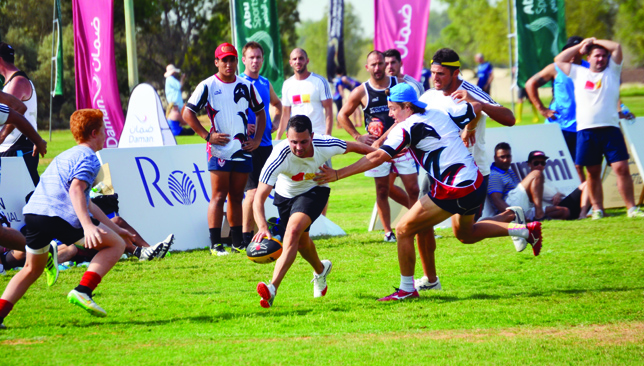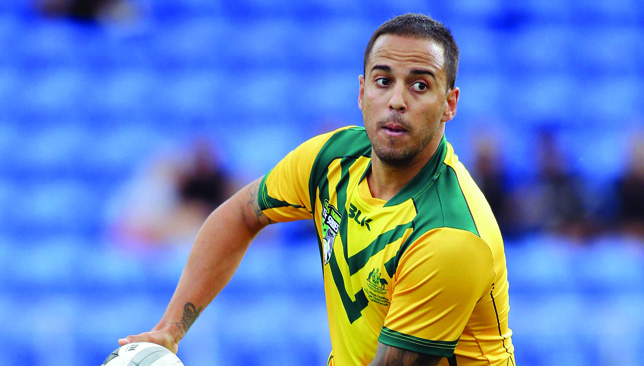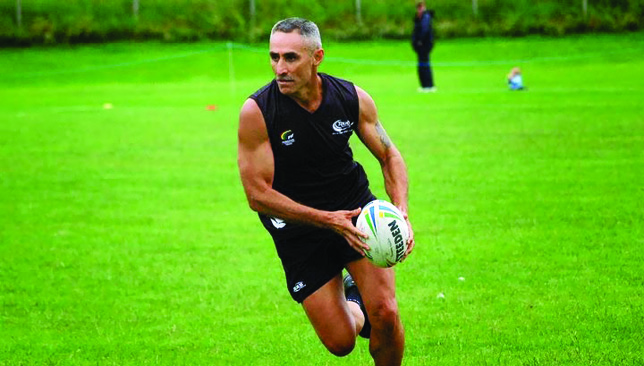
Having a player regarded as the best in the world currently and another dubbed the Godfather of the game, the organisers behind the Middle East Touch Championships have certainly brought out the big guns for the third edition of the tournament which takes place in Dubai Friday.
The event will bring two of the sport’s most revered figures together at Dubai Polo and Equestrian Club, as they throw their support behind this year’s tournament.
Australian international Dylan Hennessey, 29, will be joined by New Zealand international Peter Walters (centre), a man who was forced to retire from playing rugby aged 27 – so has played touch for the last 35 years instead. Both are thrilled the game is taking off in the Middle East region.
Tell us about the Middle East Championships, what you’re doing here and how you got involved?
DH: After speaking to Scott Prince about it – Scott supported the event last year and had nothing but praise and admiration for everyone taking part – it sounded fantastic and I really wanted to be a part of it. John Larkins, founder of Middle East Touch, got in touch with me and the rest is history.
I’m really looking forward to working with both John and Peter Walters to develop touch football in Dubai, Abu Dhabi and across the Middle East.
PW: I was thrilled to be invited to come over to coach and play by John Larkins and I’m really looking forward to helping out with touch in the Middle East in general.
I hear Middle East Touch is making great progress in the region and John is doing a brilliant job of growing the sport at a grassroots level.

Dylan Hennessey.
Everyone knows about league and union but tell us about touch. Some people think it’s the same as normal rugby. Tell us why it’s different and the benefits?
DH: Well the most obvious differences between touch and league/union is that it’s a minimal contact sport, it’s a much faster game, and you get unlimited interchange throughout.
I love it because it keeps you fit, you are constantly meeting new people, and you can transfer the skills in touch to so many other games such as rugby league and union.
PW: Touch is different to rugby as there is no full contact or tackling, therefore there’s a much less chance of injury.
The game itself is really straightforward and anyone and everyone can play – you just need a ball, a field, a few people and away you go.
Tell us about touch’s growing popularity and what you see for the future of the game…
DH: Since signing a deal with the NRL, the sport has gained much more recognition in the media and is very popular throughout the schools’ system in Australia. In fact, Touch Football Australia’s goal is to have one million registered players by the year 2020.
If interest in the game continues to grow here, as well as in New Zealand, Europe, Asia and the USA, then the sky’s the limit. Just to give you an idea, the ‘O2 Touch Operation’ in the UK has seen more than 17,000 new players register in the last 12 months alone, which is truly inspiring.
PW: Touch is growing rapidly in many developing nations like the UAE and there are more and more tournaments happening all over the world to entice people to give the game a go. With the right amount of support, particularly in schools, and with more general awareness about the game in the media, the future for touch is very exciting.

Peter Walters.
John Larkins and his Middle East Touch operation are big promoters of touch in the Middle East. Tell us more about the job he’s doing out here?
DH: Well, I am really excited to get to Dubai and see for myself how far the game has taken off. I know John is totally dedicated to growing the game in the region and to developing young players into the very best they can be, and hats off to him for all the work he has done so far. The fact he also has the support of Peter Walters – the best touch ‘brain’ in the game – I am sure he will continue to be very successful.
PW: John and Tui Waruhia are doing a brilliant job promoting touch in the UAE. They seem to have a clear focus on junior and youth development, particularly in schools, which is one of the best places to start.
How did you first get involved in touch and why did you choose that over any other form of rugby
DH: My mum got me started in touch football when I was eight-years-old. She already played and my dad was a referee, so I was really into it. I played league as well but I really struggled to gain weight throughout school, so I decided to stop playing league and just focused completely on touch.
PW: I started playing in 1980 at my local rugby club in Auckland – I stopped playing rugby due to having a young family and lots of work commitments.
What skills does playing touch teach you that you can’t learn in other forms of rugby
DH: I think the key skill touch provides you with is vision. The game is so much faster than league/union and so when you go back to those contact sports it opens your game up a lot and helps you manipulate the space on the pitch so much better.
You just have to watch Benji Marshall, Shawn Johnson and Matt Moylan to name just a few who are all from touch football backgrounds.
PW: Vision and the ability to make quick decisions are unique to touch. The skill sets – ball skills, speed and fitness – all play a prominent part in the game.
What advice would you give to any youngsters playing the game
DH: I would say keep practicing and training hard – touch is a game that’s always changing so never think you know it all.
PW: Give it a try. It’s a fantastic way to improve your skills and knowledge, as well as being a great way to meet people and have fun in a safe and healthy environment.
Can't complain when house guest for weekend brings pressies👍 @mattjboucher @touchfootyaus @nsw_touch @METouchChamps pic.twitter.com/v6TKZFnC0h
— METouch (@MiddleEastTouch) 18 October 2016
Tell me about your career highlights
DH: My career highlights in touch would have to be making the Australian men’s team in 2009 and winning the World Cup in Scotland.
PW: There have been so many, including playing and winning the New Zealand
Nationals for Auckland in the same team as my daughter Kylee in the open mixed event in 2002, and winning three World Cups.
I have also met lots of awesome people along the way and have developed many lifelong friendships.
Who were your favourite rugby players growing up?
DH: My favourite league/union players growing up were Andrew Johns and Carlos Spencer.
Off the field what do you enjoy doing. How do you relax?
DH: I like going to the beach with my wife and kids. I have three kids under the age of four, so I don’t have much time to relax.
PW: I’m never happier than when I am spending time with my family and friends.